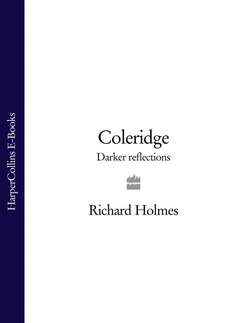Читать книгу Coleridge: Darker Reflections - Richard Holmes - Страница 38
3
ОглавлениеColeridge finally roused himself from these dreamy delights on 22 November, riding up on the night mail to London, sustained by a wing of chicken and a flask of rum laid in with his lecture papers. “If very, very affectionate thoughts, wishes, recollections, anticipations, can serve instead of Grace before & after meat, mine was a very religious Meal.”18 Daniel Stuart gave him a set of rooms above the Courier offices at No. 348, the Strand.
His mood was now buoyant. “My Lectures will be profitable – and I have rewritten my play [Osorio] – & about doubled the length of Christabel – 2 thirds are finished.” This latter claim, which seems so definite (especially when added to similar statements of progress at Coleorton) remains one of the great mysteries of Coleridge’s bibliography. No Part III of “Christabel” has ever been found among his papers, except for a possible eleven-line fragment, “The Knight’s Tomb”. Could it have been dreamt in an opium “reverie”, like the missing 250 lines of “Kubla Khan”? or could it – as Osorio so nearly was – have been lost in some “lumber-room” or newspaper wastebin? The possibilities are tantalizing.
The lectures were due to begin in a fortnight, after Davy’s were complete; but now it was Davy who fell dangerously ill after six weeks of brilliant but exhausting demonstrations, his “March of Glory” as Coleridge called it. (The illness was gaol fever, contracted while inspecting the ventilation problems at Newgate Prison.) The Literary Series was put back to January 1808, and Coleridge beguiled the time by taking Stuart back to Bristol to meet his new supporters, the Morgans, and by publishing his poem in their honour in the Courier.
The poem was entitled “To Two Sisters, A Wanderer’s Farewell”, and appeared on 10 December under the pen-name “Siesti” (an expressive amalgam of “STC” and “Siesta”). It is openly and even brazenly confessional, describing his longing “for some abiding place of love”, and the Morgans’ soothing tenderness as like the unexpected glow of winter sun “on unthaw’d ice”. It casts himself as a homeless exile, and comes very close to admitting the “poison” of his opium addiction:
Me disinherited in form and face
By nature, and mishap of outward grace;
Who, soul and body, through one guiltless fault
Waste daily with the poison of sad thought…19
Coleridge goes on through fifty lines to explore the unsettling comparison between the two sets of women that he had pointed out to Dorothy: “Two dear, dear Sisters, prized all price above,/ Sisters, like you, with more than sisters’ love…” In the younger Morgan household, “My best-beloved regain’d their youth in you”. He ends by imagining all four sitting together round the same peaceful firelit hearth, while he remains apart “in solitude” content to dream of them – “ah: dream and pine!” in proud renunciation of all worldly happiness.
The sentimentality of the poem, flooded with pain and self-pity, is so powerful that it almost disguises its strange metaphysical argument about the nature of love. The two pairs of sisters are presented as almost literal reincarnations of each other, in “statures, tempers, looks, and mien”. The memory of the one imposes itself, physically, on the vision of the other:
Sight seem’d a sort of memory, and amaze
Mingled a trouble with affection’s gaze.
For Coleridge at this moment, all hopes of love and acceptance seem caught up in a fatal cycle of repetition, the past doomed to re-enact itself in the present.* This pattern, both soothing and imprisoning, suggests some original childlike state of emotional dependence from which he cannot escape. So the undertone of the poem is fretful, reproachful, even angry. One wonders, most of all, what Asra would have made of it, for her love still seems Coleridge’s hidden theme. As he confided to his Notebooks at this time: “It is not the Wordsworths’ knowledge of my frailties that prevents my entire Love of them: No! it is their Ignorance of the Deep place of my Being – and O! the cruel misconception of that which is purest in me, which alone is indeed pure – My Love of Asra…”20
If this publication was intended as a signal of reproach, or even defiance, to those in the Lake District, it did not go unnoticed. Mrs Coleridge and Southey (who knew Morgan) were indignant; while Dorothy was resigned to his “very unsteady” behaviour in all things.21 The Wordsworths at this very moment were planning their move to Allan Bank, a larger house west of Grasmere around the margins of the lake, partly so Coleridge and his children could be accommodated. But Dorothy did not now think he would have “the resolution” to come north again. Yet she still recognized his incalculable powers of self-renewal: “how Coleridge does rise up, as it were, almost from the dead!”. She hoped his lectures would be of service to him, “especially as his exertions for the cause of human nature (such I may call them) will be animated by his strong sentiments of friendship and veneration for my Brother”.22
